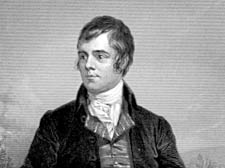|
|
 |
| |

Robert Burns: the supreme Scottish nationalist |
The secret firebrand in Burns
John Gulliver reviews a new book which
highlights the political activism of the man who wrote Auld Lang Syne and reveals why he would oppose Scottish Trident if he were here today
SADLY, Robert Burns is marketed and branded down to the last penny.
When the author Andrew O’Hagan interviewed a Burns Festival organiser in the poet’s hometown of Ayr he said he had a “unique selling” point. “It’s fair to say Auld Lang Syne is the second most popular song after Happy Birthday,” he told O’Hagan. “You see he is a very attractive product.”
Tomorrow (January 25) at Burns Supper nights throughout the world, there will be a gushing of tartanry – with kilts flying, bagpipes playing, and recitations of the poet’s evergreen numbers, such as Tam o’ Shanter, the one about the mouse (the “tim’rous beastie”) with the memorable lines of “The best laid schemes of Mice an’ Men/Gang aft agley”, not to mention such songs as My Love is Like a Red Red Rose, Coming Thro’ the Ry and Jo Anderson My Jo.
This is where the ballyhoo about Burns makes admirers feel queasy in the presence of what has become part of a branding operation.
Stories and biographies on Burns fill the shelves, but most of them miss out on Burns the revolutionist, Burns the supreme Scottish nationalist, Burns the political man.
And this is what O’Hagan set out to achieve in an anthology that reintroduces this world-class poet to today’s generation.
Burns worked hard and long on a farm until he was 25, but, inspired by his father’s love of books in the best Presbyterian sense, wrote his first collection of poems which turned him overnight into a Scottish celebrity as fast as Big Brother creates them today.
He richly deserved the accolades that poured down on him from the Edinburgh bourgeoise, but, more importantly, from the Scottish poor, for here was a poet who spoke directly to them in their own dialect, sharing their grievance against the Lairds and England, the foreign power. Meanwhile, the Edinburgh gentry wined and dined Burns, hanging on his every word, just as a century later the English wealthy took up Oscar Wilde.
Burns was already feeling the flow of the French Revolution and, even later, after he eked a living as an excisemen – filling a similar post to that of another great free thinker, Thomas Paine – he remained a headache for the authorities.
It may be a myth, but, after a French ship ran aground in his area, Burns is said to have saved two of its canons to send them back to the French.
A tall tale, perhaps, but if he could have done it, he would have. Even so, in a letter about that episode, Burns described himself and two comrades as the “awkward squad” – coining yet another expression that has passed down the centuries.
O’Hagan makes Burns a relevant modern figure. After reading his poems and O’Hagan’s notes on them, you know where, for instance, Burns would stand in the debate over resiting Trident submarines in Scotland. He’d be against it. And his ghost will, I’m sure, hover over an anti-Trident rally by the Scottish TUC on Saturday in Glasgow.
I have come late to Burns, but O’Hagan has turned me into a camp follower, placing him for me alongside Shelley and Byron – other champions of liberty.
You’ll find most of Burns’s splendid pop poems and songs in this anthology, but it’s the direct political ones that put him ahead of his time.
O’Hagan converses with the work in an easy style – his commentary on the page facing a particular poem is often straight to the point.
On one page he reprints straight a Ministry of Defence press release on the death of 19-year-old Fusilier Gordon Campbell Gentle in Basra, Iraq, and on the other, the anti-war poem, I Murder Hate. Gentle’s mother Rose now helps to mobilise military families against the Iraq war.
O’Hagan quotes Mohammed Ali’s defiant refusal to take part in the Vietnam war, and opposite it runs the beautiful Slave’s Lament.
Again, he describes how Burns’s magnificent The Tree of Liberty remained unpublished for 40 years after his death in 1796, aged 37, because it was simply dynamite, with lines like:
Upo’ this tree there grows sic fruit,
Its virtues a’ can tell, man;
It raises man aboon the brute…
Gif ance the peasant taste a bit,
He’s greater than a lord, man…
And further on:
We labour soon, we labour late,
To feed the titled knave, man;
And a’ the comfort we’re to get
Is that ayont the grave, man.
Showing his love of Burns, O’Hagan finishes with that “Marseilles to the human spirit”,
A Man’s a Man for a’ That, placing him as the “world’s greatest and most loveable poet”. When you read the poem’s last stanza you get the hang of what O’Hagan means:
Then let us pray that come it may,
As come it will for a’ that,
That Sense and Worth, o’er a’ the earth
Shall bear the gree, and a’ that.
For a’ that, for a’ that,
It’s comin yet for a’ that,
That Man to Man the warld o’er
Shall brothers be for a’ that.
|
 |
|
 |
 |
|
 |
|


